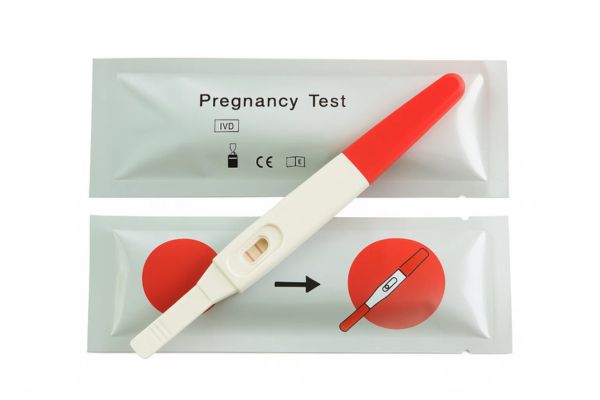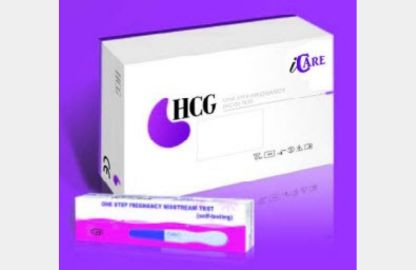Table of Contents
Objective
This article aims to clarify widespread misconceptions surrounding HCG pregnancy test kits, particularly those related to usage, accuracy, timing, interpretation and reliability. By addressing these myths, readers can make informed decisions and use the pregnancy test kit HCG more effectively without misinterpreting results due to misinformation.
Myth: All HCG pregnancy test kits have the same accuracy
Not all HCG pregnancy test kits are manufactured with the same quality control, sensitivity or detection threshold. Some rapid pregnancy detection kits are designed to detect HCG at levels as low as 10 mIU/mL, while others may only react when HCG reaches 25 mIU/mL or more.
This variance affects early detection capability. A person testing five days before a missed period using a less sensitive test may get a negative result, while a more sensitive kit might already show positive. The assumption that all kits yield the same accuracy regardless of brand, type or cost is inaccurate. Always check the test’s sensitivity on the packaging or instruction leaflet before using it.
Myth: HCG levels rise consistently in all pregnancies
Many believe HCG levels increase uniformly in all pregnancies and that this guarantees predictable test results. However, HCG production may vary due to biological differences. Some individuals produce HCG more slowly or may have delayed implantation, which affects test outcomes, especially in the early stages.
This means even if a test is performed at the “right” time, a negative result may not be definitive. Using an HCG urine test pregnancy kit too early may produce a false-negative due to naturally low hormone levels in some individuals. Retesting after 48–72 hours is always recommended for accurate tracking.
Myth: A negative result from an HCG test means you’re definitely not pregnant
A single negative test result is not always conclusive. Several logical factors can lead to false negatives:
- Testing too early before the HCG hormone is detectable
- Using diluted urine, which lowers hormone concentration
- Improper storage or expired kits
- Not following the test instructions (especially time and sample application)
Many advanced pregnancy test kits advise users to wait until the first day of the missed period for testing and recommend first-morning urine. A false-negative does not rule out pregnancy, especially if symptoms persist.
Myth: Expired pregnancy test kits are still usable if unopened
Even if a test kit is sealed and appears physically intact, using it past the expiration date is unreliable. The reagents in HCG pregnancy test kits degrade over time, reducing their reactivity to HCG hormone in urine.
This degradation compromises the accuracy and can result in invalid results or faint lines that don’t reflect actual HCG presence. Manufacturers clearly print expiration dates for this reason. It’s not just a precaution – it reflects tested shelf life. Discard and replace expired test kits regardless of appearance.
Myth: All positive HCG test results confirm pregnancy
While most positive results indicate pregnancy, certain situations may yield false positives, such as:
- Presence of HCG from fertility medications
- Rare medical conditions
- Residual HCG after a recent miscarriage or abortion
False positives are rare but possible. A follow-up test and clinical evaluation help confirm results, especially if the positive line is faint and inconsistent. The best pregnancy test kits reduce cross-reactivity, but confirmation via blood test remains the gold standard when results are uncertain.

Myth: Timing doesn’t affect the test outcome
Users often overlook the significance of time – both in when they test and how long they wait to read results. Two aspects matter:
- Testing too early: Before the body produces enough HCG
- Reading results too late: After the advised time window, evaporation lines may appear
For example, most HCG pregnancy test urine kits instruct reading within 3-10 minutes. After that, any visible lines may not be valid. Misreading due to poor timing contributes to user error, not test kit failure. Always follow the recommended procedure and read within the instructed window.
Myth: Morning urine is not necessary for accurate results
This myth assumes that urine sample timing is irrelevant. While some HCG pregnancy rapid tests claim “anytime use,” the highest concentration of HCG is typically found in first-morning urine. Especially in early pregnancy, this is critical.
Testing in the evening or after excessive fluid intake may dilute urine and decrease HCG concentration, potentially leading to false negatives. While modern kits may allow flexible timing, first-morning samples consistently offer the best chance of accurate detection.
Myth: All HCG urine tests work the same regardless of format

Pregnancy test kits are available in multiple formats:
- Strips: Require dipping into a urine cup
- Cassettes: Involve pipetting drops into a sample well
- Midstream devices: Direct urination on the test
Each format has unique handling instructions and tolerance for user error. Assuming that testing methods are interchangeable across formats is inaccurate. For example, applying urine incorrectly on a cassette-based HCG pregnancy kit may produce invalid results, while over-saturating a test strip may flood the membrane. Correct handling based on the kit type is essential to get accurate readings.
Myth: Costlier kits are always more reliable
The assumption that higher price equals higher accuracy isn’t always valid. The price may reflect brand marketing, packaging or digital features rather than improved sensitivity or specificity. Several HCG pregnancy test kits manufacturers produce cost-effective, high-performance kits that meet clinical standards.
Key indicators of reliability include sensitivity level (in mIU/mL), user feedback and whether the kit complies with regulatory standards – not the price tag. A strip-based HCG pregnancy test with high sensitivity can be just as accurate as a premium midstream device if used correctly.
Read Our Article: iCARE Pregnancy (HCG) Test Kit – An Overview
Myth: You can’t trust at-home pregnancy tests – only blood tests are reliable
While blood tests remain the clinical standard, modern HCG urine pregnancy test kits are highly accurate when used correctly and at the right time. Most quality at-home kits claim over 99% accuracy from the day of the missed period.
Blood tests measure exact HCG levels, whereas urine tests detect whether the hormone has crossed a certain threshold. Both are valid; the latter offers rapid, convenient screening and is particularly useful in confirming suspicions before visiting a healthcare provider.
The myth that home tests are “too unreliable” undermines their value. In fact, rapid pregnancy detection kits offer consistent performance when stored properly, used within expiry and handled according to instructions.
Conclusion
Widespread myths about HCG pregnancy test kits continue to mislead users, often leading to confusion, false assumptions or unnecessary anxiety. The reality is that accuracy depends on factors like test sensitivity, urine concentration, correct usage and timing – not hearsay or assumptions.
From understanding test types (strip, cassette, midstream) to recognizing the limits of early testing, users benefit significantly from clear, factual information. By debunking these 10 logical and technical myths, individuals can rely on HCG pregnancy test kits with more confidence and interpret their results accurately.
FAQs About HCG Pregnancy Test Kits
Top 10 Myths about Pregnancy Tests
Can HCG test kits be used before a missed period?
Yes, if the kit is labeled as an “early detection” type with a sensitivity of 10 mIU/mL. However, accuracy increases closer to or after the missed period.
Is a faint positive line still a valid result?
Yes. A faint line usually means the test has detected HCG. It’s best to test again in 48–72 hours to confirm rising levels.
How do I know if a pregnancy test kit is reliable?
Check the sensitivity threshold (10–25 mIU/mL), manufacturing compliance and instructions. Use within expiry and store as advised.
Do medications affect HCG test results?
Only medications containing HCG (often used in fertility treatments) can impact results. Most other drugs do not interfere with the test.
Can I reuse a pregnancy test kit?
No. All HCG pregnancy test kits are designed for one-time use. Reusing a test will not yield accurate results and may show invalid lines.








